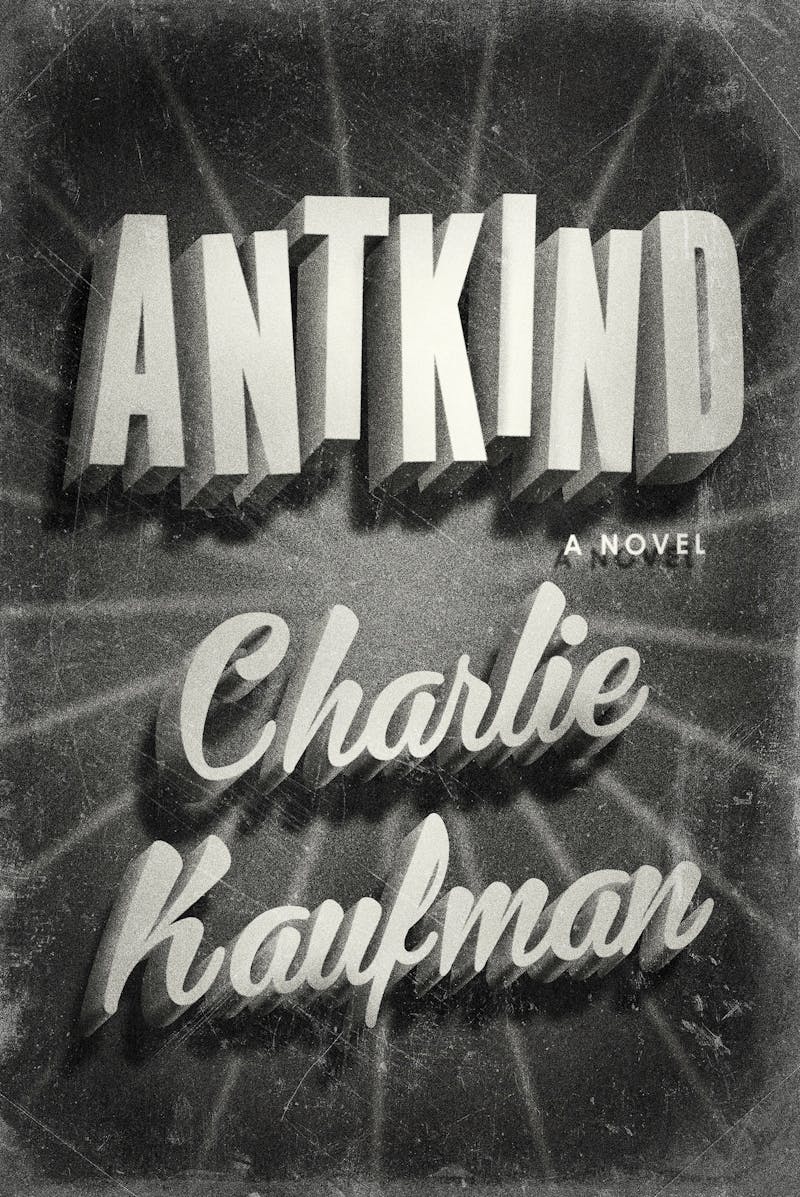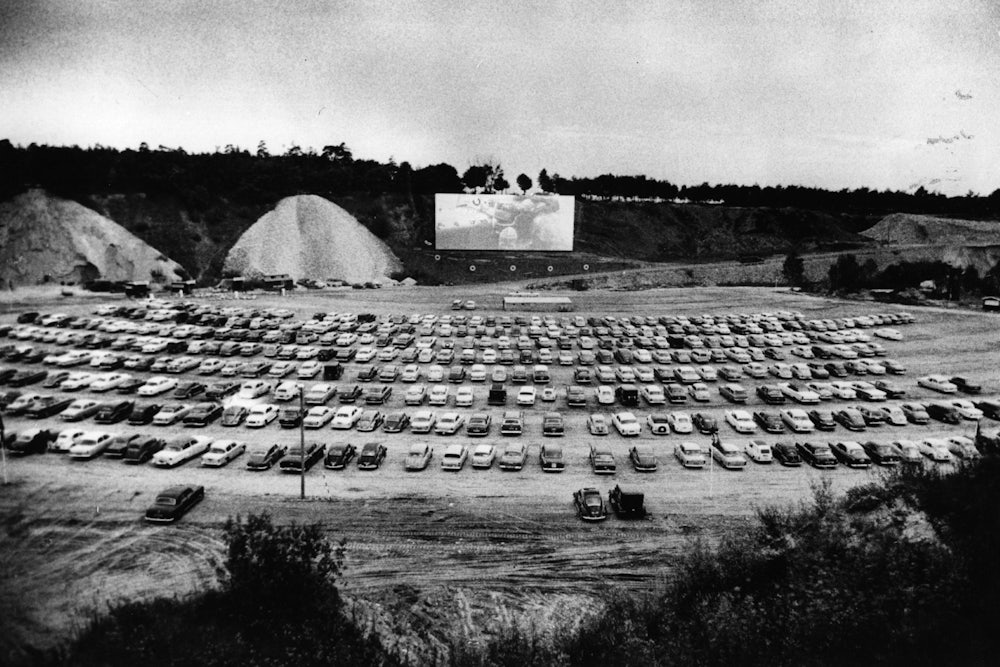B, the narrator of Charlie Kaufman’s novel Antkind, is B. Rosenberger Rosenberg, a bald, middle-aged film critic with bottle-top glasses and a flowing Whitmanesque beard, who goes only by his lone initial so as “not to wield my maleness as a weapon.” B is the worst sort of performative white male culture critic, knowing what to say publicly and trashing those who do not, all while tortuously trying to hide his own archly regressive personality. He lets most Black people he meets know immediately that he has had a Black girlfriend, but just as quickly dismisses any notion you might have that he’s Jewish. He rails about toxic masculinity in the films of Pee-wee Herman, but leaves snipy, argumentative comments—anonymously, of course—on his estranged daughter’s blog.

It’s these wild swings in attitude that inform B’s unhinged film criticism, where he offers an outsize sense of competitive superiority to filmmakers and only views what flatters his ego as acceptable. Even just making a decision about where to get coffee triggers him:
Starbucks is the smart coffee for dumb people. It’s the Christopher Nolan of coffee. Dunkin’ Donuts is lowbrow, authentic. It is the simple, real pleasure of a Judd Apatow movie. Not showing off. Actual. Human. Don’t compete with me, Christopher Nolan. You will always lose. I know who you are, and I know I am the smarter of us.
B feels equally superior to his readers and audiences. At one point, he explains the seven different types of viewings he requires of a movie before writing about it. He describes the first stage as seeing it without the aid of his vast cinematic knowledge, as an average moviegoer would, which he calls, “the Nameless Ape Experience.”
Besides a love of Judd Apatow movies, B’s other cinematic passion is his abiding hatred for the films of Charlie Kaufman. B considers Kaufman a pretentious, condescending intellectual poser who cares nothing for the common man (not unlike B himself). He calls his Kaufman lecture, “I Vote With My Feet When It Comes to Kaufman.” He finds Synecdoche, New York “a tortuous, tortuous yawn,” and calls Kaufman “a monster, plain and simple, but a monster unaware of his staggering ineptitude.”
These indictments of Charlie Kaufman are not a big surprise in a Charlie Kaufman story, as they take us into the self-reflexive territory central to so much of his writing. B’s rants about Kaufman are usually punctuated by slapstick: birds defecating on him, B getting whacked on the side of the head with planks of wood carried by clumsy Laurel and Hardy–like workmen who unexpectedly turn around, or B repeatedly falling into any nearby open manhole (“personhole,” as he calls them) into rivers of human waste. Disasters happen so often that even B suspects he has a tormentor, some unseen force that keeps him from happiness—maybe Kaufman himself. That’s because, ultimately, Antkind is an argument between B and Kaufman about art and comedy.
Charlie Kaufman is best known as the writer of Being John Malkovich, Adaptation, co-author of Eternal Sunshine of the Spotless Mind (for which he won an Oscar), writer-director of Synecdoche, New York, and co-director of the animated feature film, Anomalisa. Kaufman’s films are not populated by slick, polished people. He specializes in men like B, a type James Thurber called “the defeated male.” Smart, angry, socially inept, semi-talented, they always remain tantalizingly close to success. Kaufman examines their lives in self-reflexive realities and dual identities, like John Cusack magically seeing the world through the ubersuccessful John Malkovich’s eyes or Nicholas Cage, as the frustrated screenwriter in Adaptation, confronted by his amiable dope of a twin brother, who turns out to be a wildly successful studio screenwriter.
B is utterly obscure, but in Antkind he finally comes upon his chance at reaching the top of the critical world. On a visit to a Florida Everglades film institution, he discovers that his neighbor, a 120-year-old African American filmmaker named Ingo Cuthbert, has independently completed a decades-long production of a stop-motion puppet movie with a running time of three months—and B is the only person to have ever seen it. He instantly recognizes Ingo’s life’s work as an opportunity for himself. “This is too good to be true: ancient, reclusive, eccentric, likely psychotic African-American filmmaker. Outsider art, undoubtedly. I have stumbled onto something magnificent. Visions of Darger dance in my head,” B thinks. “I can spin this into anthropological gold. I can dine out on this for the rest of my life. Finally I can pry open the prudish legs of Cahiers du Cinema.”
B loves the film, but shortly after he views it, Ingo dies. B loads the more than 10,000-reel print onto a U-Haul, along with all of Ingo’s notebooks and puppets, and heads north, imagining the glory that awaits him in “New York’s famed Film Criticism District (7th between 25th and the middle of the block facing uptown, east side of the street).” Unfortunately, Ingo’s only print is on highly flammable nitrate film stock, and B’s truck bursts into flames. Three months later, B wakes from his terrible injuries and medically induced coma but now can’t even remember Ingo’s film, much less present it to the world. It’s in his trying to reconstruct Ingo’s masterpiece, from a single surviving frame, via hypnosis-induced recovered memories and his waking, and dreaming life, and its multiple versions of reality, that the novel becomes unmistakably Kaufman.
Charlie Kaufman did not begin his career as a filmmaker but as a comedy writer for the National Lampoon, then on 1990s sitcoms like Get a Life and Ned & Stacey, until Being John Malkovich launched his movie career. Comedy—Kaufman’s definition of it, Apatow’s, its uses, and B’s hatred of it—is a large part of the conversation of Antkind. Kaufman steeps the book with references to obscure comedy like the Three Stooges’ foil Vernon Dent, a functioning comedy hotel based on the one in Roscoe Arbuckle’s The Bell Boy, Olsen and Johnson movies, Walter Mitty, Viola Spolin, Allen Funt, Joe Besser, Floyd Norman, and Ike Barinholtz, and B’s landlord is Sid Fields, Abbott and Costello’s landlord on their television show. Lou Costello himself features prominently in B’s memory of Ingo’s film, which portrays Costello as a ruthless killer who bumps off any and all up-and-coming comedy teams who threaten Abbott and Costello’s box office dominance.
B loathes comedy (especially Kaufman’s), which is why Kaufman has damned him to this pratfall Hell. Of Ingo’s masterpiece, B gushes, “[I]t’s a comedy about the nightmare that is humor—a critique of comedy, if you will. It postulates the coming end of comedy, the need for its abolition, the need for us to learn empathy, to never laugh at others.” B’s complaint is not the usual “comedy has gotten too P.C.” or punching up/punching down debates we see so often. It’s the thing that infuriates so many, that lights up social media almost daily, the very fact that someone, something, anything, is ridiculed at all: “The truth I’ve come to is that we need to laugh, as long as nothing is the object of that laughter, as long as nobody is hurt.” “Comedy is a lie,” B tells us:
It sits Godlike in its judgment and by definition is the antithesis of empathy. Comedy sits on its throne and states, “You are ridiculous. You are pathetic. You are stupid. Your pain amuses me. Most important, I am not you.”
Fittingly for a film critic, B is a master of projection, as he’s only describing himself, as so many of those outraged by jokes do when dragging the joker. Kaufman isn’t dismissing all critics or criticism. B is a specific arrogant type. B considers Manohla Dargis (an avid Kaufman fan) his enemy and Richard Roeper to be Christopher Nolan’s “pool boy.” One of the few critics B quotes admiringly is The New Yorker’s Richard Brody, specifically from his review of Wes Anderson’s Moonrise Kingdom: “It’s not enough to love a movie—it’s important to love it for the right reasons.”
B believes that, too, and that’s his great flaw as a critic. Kaufman is not hiding B’s physical and ideological resemblance to Brody. They share those trademark beards and the same initials. Each fell in love with cinema as freshman Ivy Leaguers after a seeing a Godard movie (and then wrote books about Godard). Brody has specifically dismissed Kaufman in the same language that B uses. He has also written rapturous reviews of Apatow’s Knocked Up, This is 40 (only complaining that it wasn’t long enough), and Funny People. Like B, he regularly gives Apatow spots on his “Best of” lists. Brody compares Apatow favorably to Ernst Lubitsch and John Cassavetes, and both he and B shrug Kaufman off as a third-rate Pirandello. In a review titled “The Condescending Compassion of Charlie Kaufman’s Anomalisa,” he calls Kaufman’s Oscar-winner “the off-Hollywood equivalent of Entourage.” Although B himself drips self-satisfied superiority, his major problem with modern comedy is that it’s too knowing: “Who I do not honor are the comedians who condescend. The Charlie Kaufmans, the Pee Wee Hermans, the Robert Downey, Seniors (Junior is genius).”
Certainly, B’s life and Brody’s differ in significant ways. Richard Brody is hardly an obscure critic, and he undoubtedly has better luck navigating New York City personholes, but the radically different views Brody and Kaufman have about comedy inform much of B’s narration. B’s insistence we not just enjoy films, but for the right reasons, fuel his mission to recover Ingo’s film from his memory. For once, only his interpretation of the film will exist, not even the film. Then Ingo’s masterpiece changes B’s life. He has finally met the work of art, the filmmaker, that overwhelms him. After seeing it he calls his editor to quit film criticism altogether. “The days of flag-planting, of claiming ownership are done. From here on in, I will submit to great art.” There are more twists for B after that, but in that moment you see the kind of anti-art criticism that has defined B’s career, and which ruins him as a critic.
There are many detours and diversions in Antkind: the lengthy descriptions of Ingo’s comedy nightmare set in the world of Hollywood comedy teams and two-reelers, Brainio (the device that beams movies fused with your ideas into your head), meeting President Donald J. Trunk, B taking a job at a clown shoe factory, his fetish for clown sex, and the moment he encounters his successful doppelgänger. It’s easy to get lost in Kaufman’s unwieldy multiplex of storylines, but it’s never not funny.
